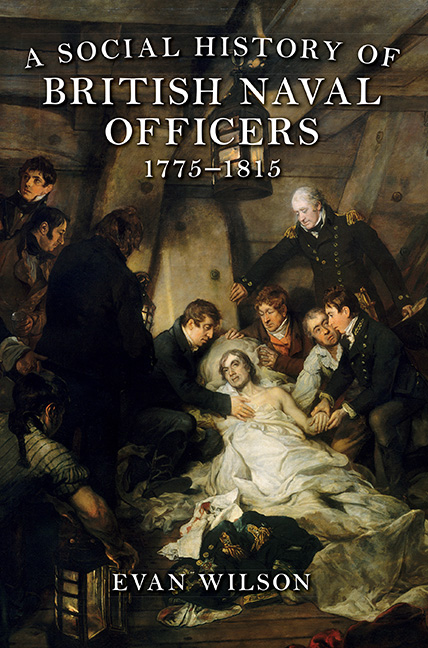Book contents
- Frontmatter
- Dedication
- Contents
- List of Illustrations
- Acknowledgements
- Abbreviations and Conventions
- Introduction
- 1 The Education of Young Gentlemen
- 2 Commissioned Officers’ Careers
- 3 Warrant Officers’ Careers
- 4 The Wardroom as a Social Space
- 5 Patronage and Promotion Prospects
- 6 Pay and Prize Money
- 7 Domestic and International Comparisons
- 8 Naval Officers’ Social Status
- Conclusion
- Appendix
- Bibliography
- Index
- Frontmatter
- Dedication
- Contents
- List of Illustrations
- Acknowledgements
- Abbreviations and Conventions
- Introduction
- 1 The Education of Young Gentlemen
- 2 Commissioned Officers’ Careers
- 3 Warrant Officers’ Careers
- 4 The Wardroom as a Social Space
- 5 Patronage and Promotion Prospects
- 6 Pay and Prize Money
- 7 Domestic and International Comparisons
- 8 Naval Officers’ Social Status
- Conclusion
- Appendix
- Bibliography
- Index
Summary
The command now fell upon the subject of these pages; his feelings may be easier felt than described. The number of messmates and shipmates, among which was a brother and no less than three captains, that he had lost, all in the short space of two months and eight days, was sufficient, indeed, to cause an excess of sorrow of heart; and nothing but the obligations he owed to his country and the service could have enabled him to undergo the charge of conducting a sinking ship across the Atlantic; so that the more the danger, the more his feelings [were] overcome by a sense of duty.
Memoir of Captain George PringleNaval officers led hard lives. The sea and the wind were a daily threat, not to mention the enemy. Disease killed the most, as George Pringle recounts in the passage above. Not only did he lose his brother and his patron in an outbreak of yellow fever in 1804, but also his leaky ship was left dangerously short-handed. Pringle's mission, to carry French prisoners from the West Indies back to Britain, did him no favours; to keep ahead of the water seeping into the hold, Pringle fed the prisoners full rations and put them to the pumps for the duration of the transatlantic voyage. They were lucky to survive. Success in a naval career required toughness; Pringle suggests it also required a belief that the privations were worth enduring for the sake of a higher calling.
Commissioned officers left their families as boys in the hopes of finding adventure, only to endure experiences like Pringle's: an adventure, to be sure, but not the stuff of Nelsonic legend. To survive, they needed to learn the rhythms of shipboard life and the skills of their profession. To protect the nation's enormous investment in men and materiel, the navy tested officers to ensure they had learned the required skills. Newly-commissioned lieutenants strapped swords around their waists and draped blue coats over their shoulders. They were now qualified to stand a watch on a ship at sea; they were also now gentlemen.
- Type
- Chapter
- Information
- A Social History of British Naval Officers, 1775-1815 , pp. 223 - 226Publisher: Boydell & BrewerPrint publication year: 2017



